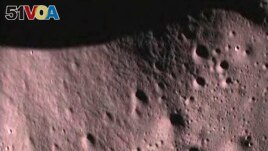India will soon attempt to land a spacecraft on the point farthest south on the moon, its south pole.
The attempt comes just days after the failure of a Russian moon lander. India's space agency on Monday released images its spacecraft captured on the far side of the moon. That is the part of the moon that cannot be seen from Earth.
The Indian Space Research Organization (ISRO) launched the spacecraft called the Chandrayaan-3. ISRO had been in a race with Russia to be the first national space agency to land on the lunar south pole. The area is thought to hold water ice that could support a future moon settlement.

This handout picture provided by the Indian Space Research Organisation (ISRO) shows the surface of the moon taken by Moon Impact Probe. (REUTERS/Indian Space Research Organisation/Handout)
As news of the failure of Russia's Luna-25 mission spread on Sunday, ISRO said that Chandrayaan-3 was set to land on August 23.
The mission is India's second attempt to land on the south pole of the moon. In 2019, ISRO's Chandrayaan-2 mission successfully launched an orbiter, but its lander crashed. Chandrayaan means "moon vehicle" in Hindi and Sanskrit
The ground at the lunar south pole is uneven making landing there difficult. A first landing would be historic. The area's water ice could supply fuel, oxygen and drinking water for future missions.
Images released on Monday showed craters on the moon's surface captured by the spacecraft's camera. The camera is designed to help identify a safe landing place for the spacecraft.
India's moon mission launched on July 14. The Chandrayaan-3's lander separated from the rest of the spacecraft last week.
For India, a successful moon landing would mark its arrival as a world space power. Prime Minister Narendra Modi's government aims to increase investment in private space launches and related satellite-based businesses.
Manish Purohit is a former ISRO scientist. "If Chandrayaan-3 succeeds, it will boost India's space agency's reputation worldwide," he said.
Russia's Luna-25 crashes
Russia's Luna-25 spacecraft crashed into the moon after it went into an uncontrolled orbit, the country's Roscosmos space agency said Sunday. The pilotless spacecraft had been expected to land Monday.
However, Roscosmos said it lost contact with the Luna-25 on Saturday after the spacecraft reported problems.
Vitaly Egorov is a popular Russian space expert. He said the mission had some successes although it crashed.
"Luna 25 showed important progress. It flew toward the Moon, carried out orbit correction, and tested onboard electronics and scientific tools," he said. "Russian cosmonautics was not at this level before. But then, an error occurred somehow."
The lunar mission was Russia's first since 1976, when it was known as the Soviet Union. Only three governments have successfully landed on the moon: the Soviet Union, the United States and China.
Scientists at ISRO have said they learned from the earlier moon mission's failure and made changes to Chandrayaan-3. They said a successful landing is now more likely. The changes include making it possible to land safely anywhere within a larger landing area in difficult conditions. It also holds more fuel, carries additional solar panels and has stronger legs.
I'm Dan Novak.
Dan Novak adapted this story for VOA Learning English based on reporting by The Associated Press.
___________________________________________________
Words in This Story
lunar — adj. related to the moon
crater — n. a hole in the surface of the ground caused by an explosion or something that is very heavy falling there
boost –v. to lift up; to raise
reputation –n. the common opinion that people have a person, group, organization or country
onboard –adj. carried on a vehicle and not placed somewhere else
cosmonautic — adj. related to cosmonauts, Russia's version of astronauts
solar panel –n. a flat device that creates electricity using energy from the sun
